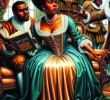Tulsa, Namibia, Hitler, January 6: History Matters
Roger Manus / June 11, 2021“I wish I had the flexibility to teach a lot of things.” That was the response of my tenth-grade history teacher to my request to learn more about Black history. It was February of 1968. The civil rights movement was still going strong. Two months later, Dr. King would be assassinated. Significantly, I was raising my question in my home at the time, Tulsa, Oklahoma, the site of one of the deadliest racial massacres in American history. That two-day frenzy of racial terror by a White mob abetted by law enforcement had occurred in 1921, a mere 47 years earlier. Yet, I had not then heard of it and I doubt that my history teacher had either—so complete has been the whitewashing of American racial history.
Three decades before Hitler’s rise to power in Germany, German colonial officials in southwest Africa (now called Namibia) began a four-year campaign to eliminate the native Herero and Nama peoples. The campaign forced native people into the dessert to starve and then sent many of them in locked freight cars to work camps where they were knowingly worked to death on projects to benefit the colonizers. Most of the native people did not survive this genocide. Some of the survivors were forced to remove the skin from the skulls of their murdered brethren before the skulls were transported to Germany for use in research attempting to prove White racial superiority. These practices presaged the genocidal practices of the German Nazi state.
That recent history was not taught to the Germans who came of age in the early part of the twentieth century, the citizens who later supported or acquiesced to the Nazi regime. Without this historical knowledge, these Germans were not asked to come to grips with the racism in their society, the impact on its victims, the moral implications for those who benefited and went along. If they had, how might things have been different in Germany and the wider world? Would Hitler and the Nazi party still have succeeded in convincing German citizens of “Aryan superiority”, and the acceptability of scapegoating and dehumanizing Jews, persons with disabilities, gay people, the Romani and socialists? Would there even have been a second world war?
Likewise, what if people of my generation and others had been taught about the Tulsa massacre, or for that matter, the racial massacre and coup d’etat in Wilmington, North Carolina, the lynchings, the details about the treatment of Native Americans, the systemic racism in home ownership policies, education, voting, etc.? Would we still be able to tell ourselves that conditions, opportunities and thought processes today are unaffected by the decisions and actions of years past? Would so many of us be susceptible to the political hucksters stoking White resentment and hostility with coded language? Would most of us White people still be so unpracticed in thinking about and discussing race with an open heart that we cannot even discuss or acknowledge racism without extreme defensiveness? Would we still tolerate a major political party’s refusal to allow a bipartisan inquiry into the January 6 attack on our Capitol by a White mob carrying Confederate battle flags and lynching equipment?
Just as the experience of Germany is a cautionary tale, it offers hope. After World War II, Germany dismantled its monuments honoring Nazi political and military leaders. It replaced them with public reminders of the victims of Nazi atrocities. It included more complete historical accounts in its textbooks. Germany is now also acknowledging and apologizing for its earlier genocide in Namibia and discussing the amount and form of reparations. The recent rise in support for the far-right in Germany shows that the work of truth-telling and reconciliation there is not complete. Yet, Germany has a more diverse and inclusive society than could have been imagined in the 1940s. People can handle the truth without hating themselves, their forbearers or their country. With an honest and mature acknowledgment of the good and the bad of our history and its continuing repercussions, we too can move toward racial justice.
Roger Manus is a retired Campbell Law School Clinical Faculty and a leader of racial justice study trips.







